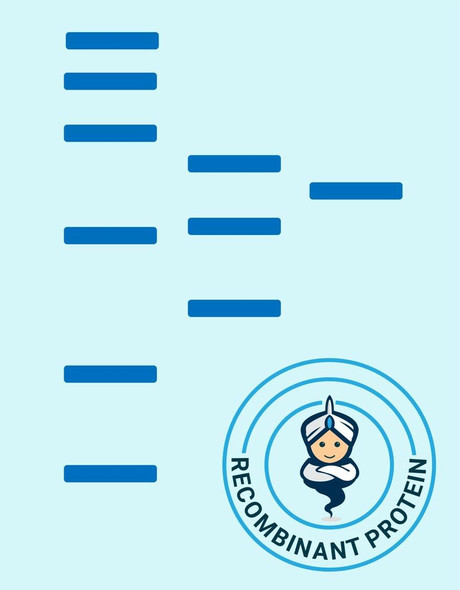Description
| Product Name: | Human sRAGE Recombinant Protein |
| Product Code: | RPPB4818 |
| Size: | 10µg |
| Species: | Human |
| Target: | sRAGE |
| Synonyms: | Advanced glycosylation end product-specific receptor, Receptor for advanced glycosylation end products, AGER, SRAGE, RAGE, MGC22357. |
| Source: | Escherichia Coli |
| Physical Appearance: | Sterile Filtered White lyophilized (freeze-dried) powder. |
| Formulation: | The sterile filtered (0.4 �m) concentrated (0.5mg/ml) protein solution was lyophilized with 30mM acetate buffer pH-4. |
| Solubility: | Add 0.1M Acetate buffer pH4 to a working concentration of 0.5mg/ml and let the lyophilized pellet dissolve completely. |
| Stability: | Store lyophilized protein at -20°C. Aliquot the product after reconstitution to avoid repeated freezing/thawing cycles. Reconstituted protein can be stored at 4°C for a limited period of time. |
| Purity: | Greater than 95% as determined by SDS-PAGE. |
| Amino Acid Sequence: | MRGSHHHHHH GMASAQNITA RIGEPLVLKC KGAPKKPPQR LEWKLNTGRT EAWKVLSPQG GGPWDSVARV LPNGSLFLPAV GIQDEGIFRCQ AMNRNGKETKS NYRVRVYQIP GKPEIVDSASE LTAGVPNKVG TCVSEGSYPA GTLSWHLDGKPL VPNEKGVSVK EQTRRHPETG LFTLQSELMV TPARGGDPRP TFSCSFSPGL PRHRALRTAP IQPRVWEPVPL EEVQLVVEPE GGAVAPGGTV TLTCEVPAQP SPQIHWMKDGVP LPLPPSPVLI LPEIGPQDQG TYSCVATHSS HGPQESRAVS ISIIEPGEEG PTAGEGFDKV REAEDSPQHM |
sRAGE is a member of the immunoglobulin superfamily of cell surface molecules. sRAGE is a receptor for various molecules, including the amyloidogenic form of serum amyloid A, amyloid-beta protein, members of the S100/calgranulin superfamily and advanced glycation end products. sRAGE lies within the major histocompatibility complex (MHC) class III region on chromosome 6. Alternative splicing results in two transcript variants encoding different isoforms. sRAGE mediates interactions of nonenzymatic glycosylated proteins which accumulate in vascular tissue during aging & at an increasing rate in diabetes. sRAGE is a receptor for amyloid beta peptide.
sRAGE Human Recombinant produced in E.Coli is a single, non-glycosylated, polypeptide chain containing 339 amino acids and having a molecular mass of 36.5 kDa. The Human sRAGE is fused to a 14 a.a. His tag at N-Terminus.The Human sRAGE is purified by proprietary chromatographic techniques.
| UniProt Protein Function: | RAGE: Mediates interactions of advanced glycosylation end products (AGE). These are nonenzymatically glycosylated proteins which accumulate in vascular tissue in aging and at an accelerated rate in diabetes. Acts as a mediator of both acute and chronic vascular inflammation in conditions such as atherosclerosis and in particular as a complication of diabetes. AGE/RAGE signaling plays an important role in regulating the production/expression of TNF- alpha, oxidative stress, and endothelial dysfunction in type 2 diabetes. Interaction with S100A12 on endothelium, mononuclear phagocytes, and lymphocytes triggers cellular activation, with generation of key proinflammatory mediators. Interaction with S100B after myocardial infarction may play a role in myocyte apoptosis by activating ERK1/2 and p53/TP53 signaling. Receptor for amyloid beta peptide. Contributes to the translocation of amyloid-beta peptide (ABPP) across the cell membrane from the extracellular to the intracellular space in cortical neurons. ABPP-initiated RAGE signaling, especially stimulation of p38 mitogen-activated protein kinase (MAPK), has the capacity to drive a transport system delivering ABPP as a complex with RAGE to the intraneuronal space. Interacts with S100B, S100A1 and APP. Interacts with S100A12. Endothelial cells. 4 isoforms of the human protein are produced by alternative splicing. |
| UniProt Protein Details: | Protein type:Membrane protein, integral; Motility/polarity/chemotaxis; Receptor, misc.; Cell cycle regulation Chromosomal Location of Human Ortholog: 6p21.3 Cellular Component: integral to plasma membrane; extracellular region; plasma membrane Molecular Function:identical protein binding; protein binding; transmembrane receptor activity; receptor activity Biological Process: cell surface receptor linked signal transduction; response to wounding; innate immune response; inflammatory response; neurite development; induction of positive chemotaxis; activation of NF-kappaB transcription factor |
| NCBI Summary: | The advanced glycosylation end product (AGE) receptor encoded by this gene is a member of the immunoglobulin superfamily of cell surface receptors. It is a multiligand receptor, and besides AGE, interacts with other molecules implicated in homeostasis, development, and inflammation, and certain diseases, such as diabetes and Alzheimer's disease. Many alternatively spliced transcript variants encoding different isoforms, as well as non-protein-coding variants, have been described for this gene (PMID:18089847). [provided by RefSeq, May 2011] |
| UniProt Code: | Q15109 |
| NCBI GenInfo Identifier: | 2497317 |
| NCBI Gene ID: | 177 |
| NCBI Accession: | Q15109.1 |
| UniProt Secondary Accession: | Q15109,Q15279, Q3L1R4, Q3L1R5, Q3L1R6, Q3L1R7, Q3L1R8 Q3L1S0, A2BFI7, A6NKF0, A7Y2U9, B0V176, |
| UniProt Related Accession: | Q15109 |
| Molecular Weight: | 41,098 Da |
| NCBI Full Name: | Advanced glycosylation end product-specific receptor |
| NCBI Synonym Full Names: | advanced glycosylation end product-specific receptor |
| NCBI Official Symbol: | AGER�� |
| NCBI Official Synonym Symbols: | RAGE�� |
| NCBI Protein Information: | advanced glycosylation end product-specific receptor; RAGE isoform sRAGE-delta; RAGE isoform NtRAGE-delta; receptor for advanced glycation end-products variant 20 |
| UniProt Protein Name: | Advanced glycosylation end product-specific receptor |
| UniProt Synonym Protein Names: | Receptor for advanced glycosylation end products |
| Protein Family: | Advanced glycosylation end product-specific receptor |
| UniProt Gene Name: | AGER�� |
| UniProt Entry Name: | RAGE_HUMAN |






